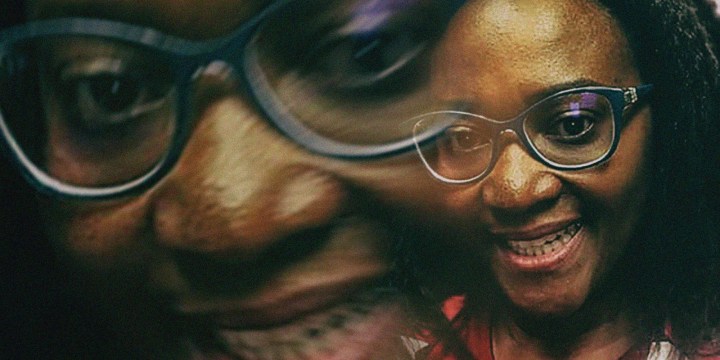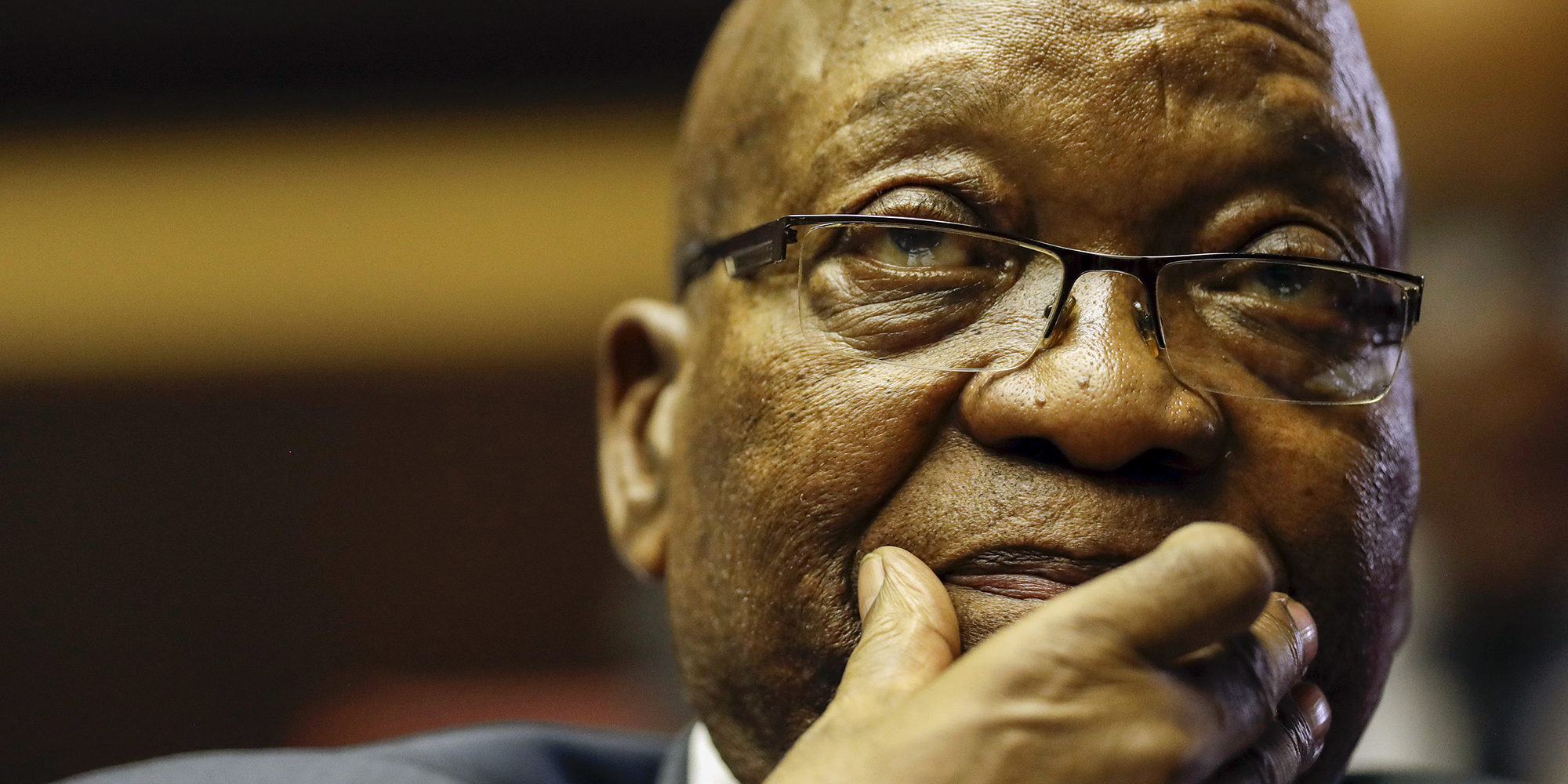THE INNER CIRCLE
Zuma’s state legal adviser, Bonisiwe Makhene-Gadini, takes secrets to her grave

With her death at the age of 53 on 26 August, advocate Bonisiwe Makhene-Gadini, Jacob Zuma’s former state legal adviser, takes to her grave many secrets surrounding former president Jacob Zuma’s tumultuous term of office.
Apart from her career with the Department of Justice and Constitutional Development, which began in 1994, advocate Bonisiwe Makhene-Gadini found herself in the headlines more due to the activities of her husband, the State Security Agency (SSA) rogue spy Yekani Gadini.
Both Makhene-Gadini and Yekani Gadini had access to former president Jacob Zuma’s inner circle.

Former president Jacob Zuma. (Photo: EPA-EFE / Themba Hadebe / Pool)
Yekani Gadini was connected to a rogue outfit in the SSA, the Special Operations Unit (SOU), which had close connections with Zuma and was found by the High Level Review Panel on the SSA to have been a parallel and illegal intelligence structure. The SOU was headed by Zuma’s “personal” spy Thulani Dlomo.
Yekani Gadini was also implicated in the SOU’s attempt to set up the bogus Workers Association Union (WAU) in 2014, allegedly at the behest of Zuma, and to counteract the Association of Mineworkers and Construction Union’s popularity in the North West Platinum Belt at Marikana.

A notice on Facebook advertising the memorial service for the late advocate Bonisiwe Makhene-Gadini. (Image: Facebook / The Department of Justice and Constitutional Development)
The spy’s role was exposed when Thebe Maswabi, founding member of the WAU, launched a R120-million civil claim against Zuma and then State Security Minister David Mahlobo, when funding to his union dried up. The cellphone number used to register WAU at the Department of Labour had belonged to Gadini.
Unlike President Thabo Mbeki’s legal adviser, Mojanku Gumbi, who was drawn from the ranks of Azapo, Makhene-Gadini’s political heartland was the ANC.
Her appointment in 2009 as Zuma’s legal adviser was seen at the time as an attempt by the governing party to drive the transformation of the judiciary according to a resolution adopted at the ANC’s national congress at Polokwane in 2008.
Shortly after he was elected president in 2009, Zuma collected around him an informal team of advisers who would become known as the “engine room”.
Much to the displeasure of tripartite alliance members the SACP and Cosatu, Zuma relied on these individuals instead of the ANC’s alliance partners to restructure the government and determine policy direction after the Mbeki years.
“By the time our team was established, President Zuma had established this team in secret without informing alliance leadership and they had already done some work,” SACP deputy general secretary Solly Mapaila told the Sunday Times in 2019.
Mapaila at the time said that testimony would be given to the Zondo Commission of Inquiry that it was here, in the “engine room” that policymaking “shifted from the ANC to an unknown secret system”, marking the beginning of what was to become the political project of capturing the state.
The alliance’s “transitional team” had included the ANC top six officials as well as the SACP and Cosatu general secretaries, Blade Nzimande and Zwelinzima Vavi, together with Ayanda Dlodlo, Neil Coleman and Clifford Motsepe. The secretariat was headed by the late Collins Chabane.
Bonisiwe Makhene-Gadini was invited to be part of Zuma’s original engine room along with Thuli Madonsela, Nathi Nhleko, Riah Phiyega, Glen Mashinini, Vincent Magwenya and Mandla Sithole NoZulu. Also linked to the “engine room” was filmmaker Duma Ndlovu.
While Madonsela soon distanced herself from the group, almost everyone else went on to be appointed to key positions in the Zuma administration, including Makhene-Gadini as his legal adviser.
Prior to this, Makhene-Gadini was the DOJ’s director of policy research. In that position she played a central role in drafting at least five judicial reform bills which were introduced in 2004, prompting criticism and an outcry from the judiciary and the legal profession.
The Superior Courts Bill and the Fourteenth Amendment Bill were later reintroduced to Parliament, unaltered, where they faced further opposition before being scrapped by the then president Thabo Mbeki.
Writing in 2007, Amy Gordon and David Bruce, in a paper for the Centre for the Study of Violence and Reconciliation, noted that:
“The saga of the justice bills, ostensibly intended to improve court management and efficiency, rationalise court structures and promote transformation of the judiciary, has been one of the biggest tests for judicial independence in the post-apartheid period.”
While Makhene-Gadini was Zuma’s official state legal adviser, the president also appointed Michael Hulley as his legal adviser in November 2011 “on a part-time basis”. Hulley raked in around R25-million in legal costs over the years as Zuma fought off various legal challenges.
Makhene-Gadini began her career in 1994 as a legal admin officer at the Department of Justice and Constitutional Development before being appointed as a special adviser to the then justice minister, Dullah Omar, between 1997 and 1999.
Between 1999 and 2003 she was a special adviser to Minister Penuell Maduna and assigned as company secretary for the justice ministry board of directors.
She was seconded as legal adviser to Zuma between 2009 and 2018. After this, she was appointed deputy state law adviser before taking up her position in January 2020 as acting head of the Justice College, where she was employed at the time of her death.
Other high-profile matters which have involved Makhene-Gadini include an attempt by Zuma to force National Director of Public Prosecutions Mxolisi Nxasana out of office by offering a “settlement proposal”.
Nxasana met with Zuma, his attorney Hulley and Makhene-Gadhini a day before Nxasana’s appointment as NDPP in 2013. When he proved too independent-minded a plan was put in motion to remove him.
Nxasana has given explosive testimony to the Zondo Commission that he did not approach Zuma to ask to be removed from the position, as the former president has stated.
It was Makhene-Gadini, the commission heard, who had presented Nxasana’s lawyer, Busani Mabunda, with a “settlement proposal” for the NDPP to be released before his term of office had expired. Zuma had also set up an inquiry, chaired by advocate Nazeer Cassim, into Nxasana’s fitness to hold office.
Nxasana was replaced in 2015 by Zuma with the now-disgraced Nomgcobo Jiba.
In 2014 Makhene-Gadini and the then police commissioner, Riah Phiyega, a friend, rushed to the Wierdabrug police station to release Yekani Gadini, who had been kidnapped by his colleagues in the SSA and stuffed in the boot of a VW Polo.
The abduction occurred, wrote Pieter-Louis Myburgh, after Gadini had met with senior SARS officials, and his kidnappers had believed the spy was in possession of documents incriminating SSA agents and tobacco bosses.
Makhene-Gadini, sources told Myburgh, had contacted police personally when she learnt of her husband’s abduction.
Makhene-Gadini’s memorial service takes place on 1 September. She takes to the grave the secrets of a president who has been placed at the centre of the capture of the South African state. DM


















 Become an Insider
Become an Insider